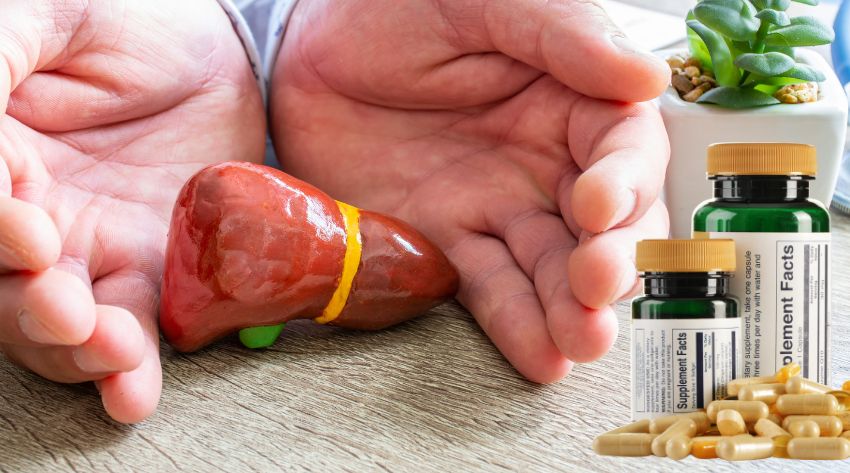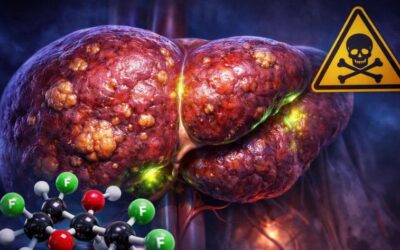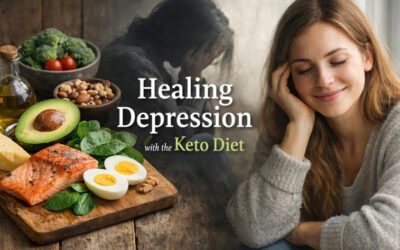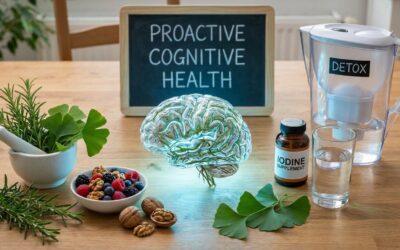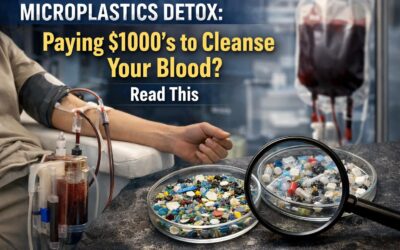In today’s modern world, we face a dilemma; we consume more toxins than ever through our food, water, air supply, and even our household products and clothing. Our body’s detox pathways are so overwhelmed they don’t know what to do and they give up! At the head of that detox system is the liver. If the liver is overwhelmed with toxins it cannot do the hundreds of jobs it has to do and this has become the source of most chronic diseases including fatty liver disease, insulin resistance, unexplained weight gain, immune issues, and more.
Due to this issue, many supplement companies are coming out with liver supplements to save the day. However, as it is with any market out there, there are companies that put out cheap liver supplements that could actually backfire and not only not help the liver but actually do more harm.
The Liver's Role as a Hero for Your Health
Many of us take our liver for granted.
It’s all too common for a person to not “see” or “feel” their liver, making it seem as if the liver does not require attention or care. Unless there is an alcohol addiction or a serious diagnosis of some form, the liver often remains out of the scope of mainstream health conversations; until something goes wrong.
On a day-to-day basis, the liver serves many roles such as filtering items, regulating metabolism, and directing hormones. It decides if your body is going to be balanced or inflamed if you are feeling resilient or overweight, and even determines your energy levels.
If someone is struggling with weight loss, hormonal issues, fatigue, or persistent brain fog, without a doubt, the liver is involved.
The Liver's Duties and Why It Needs Support
Detoxification: Internal Filtration System of Your Body
It’s safe to say that detoxification is what the liver is most known for. Any form of toxins from the air, food, water, medications, hormones, or bodily substances entering the body must move through the liver to ensure they are adequately processed.
Liver detoxification occurs in two phases:
Phase I Detox:
Within this phase, the liver employs a distinctive cohort of biocatalysts from the cytochrome P450 family which fuels the metabolism of various xenobiotics (toxins). In this phase of detoxification, hazardous compounds are transformed into reactive intermediates. These compounds are highly unstable and actually create more toxic byproducts than the original substance. This is why Phase II needs to kick in quickly!
Phase II Detox
In this phase, the liver acts to neutralize the toxic byproducts produced in phase 1 by binding them to methyl groups, sulfur compounds, or even some amino acids which make these byproducts non-toxic and soluble in water so they can be eliminated in urine or bile.
It is common for Phase I to occur at a normal rate while the second phase remains sluggish and causes the toxins to recirculate and build up. Under such circumstances, symptoms can include an imbalance of hormones, chronic fatigue, poor sleep quality, inflammation, skin breakouts, headaches, and overall sluggishness.
Your liver has the function of detoxifying:
- Prescription drugs and over-the-counter medications
- Environmental toxins (pesticides, plastics, heavy metals)
- Hormones like estrogen and cortisol
- Alcohol
- Food additives, preservatives, and artificial dyes
- Bacterial and fungal metabolites from the gut
Supporting both phases of detox requires proper liver nutrients, hydration, regular bowel movements, and most importantly, detox routines. If toxins are not being eliminated, they are stagnating.
Hormone Metabolism: Balance Estrogen and Regulating Thyroid Hormones
Your liver does not only deal with toxins; It controls some very important hormones.
Your body sends hormones, like estrogen, to the liver for breakdown once it is done with the hormones. The same applies to stress hormones like cortisol or excessive androgen hormones, like testosterone.
What happens if the liver is sluggish or congested? Those hormones will not be efficiently removed. What happens instead is recirculation, resulting in estrogen dominance, PMS, menorrhagia, acne, breast tenderness, and angry, weepy moods.
Let’s move on to how your liver health is connected to the thyroid.
How Liver Health Impacts the Thyroid
Your thyroid predominantly secretes T4, which is inactive. In order for the thyroid to perform its functions – increase metabolism, energy levels, and burn fat – T4 must be converted to its active form, T3.
More than 60% of that T4-to-T3 conversion occurs in the liver.
Should your liver be underactive, you might still have standard thyroid blood work as “normal” but have the common signs of low thyroid function including weariness, sluggish metabolism (with dry dermis), alopecia, chills, and reduced peripheral circulation, and increased body mass.
The liver also makes thyroid hormone-binding proteins which govern the amount of free (bioactive) thyroid hormone accessible to the cells. If those proteins are malfunctioning, even “normal” hormone amounts can produce symptoms.
Supporting the liver is critical for maintaining the thyroid balance, particularly for women during the peri- and post-menopausal years, as estrogen detox activation (thyroid activities) tend to slow and work simultaneously.
Liver Supplements: The Good, Bad & Ugly
Now that I’ve highlighted just a few of the key roles liver health plays in our overall vitality, let’s dive into the good, the bad, and the ugly of liver supplements.
THE GOOD
When formulated scientifically, a high-quality liver supplement can support the liver in achieving optimal health.
Your liver is responsible for over 500 biological functions and works to mitigate toxins like heavy metals, pesticides, alcohol, estrogen byproducts, and chemicals from processed food.
A quality liver supplement supports liver function without putting more strain on the liver.
A good liver supplement should feature ingredients that:
- Increase bile production (so you’re flushing toxins out, not just mobilizing them)
- Bind and remove toxins safely
- Soothe inflammation in the liver tissue itself
- Restore glutathione levels in the right natural ways
- Support detox pathways without blocking methylation or overloading sulfur pathways
That’s the magic of the right ingredients, in the right form, in the right combination. When that happens, you support the liver in a way that brings clarity, energy, smoother digestion, and more balanced hormones—because everything improves when your liver is supported.
Now let’s look at THE BAD liver supplements.
THE BAD
There are certain ingredients used in almost every liver supplement on the shelf.
These ingredients may sound good on paper, however if you have sulfur sensitivity, sluggish bile flow, mold exposure, oxalate overload, or a backed-up detox system, these ingredients will make you feel very unwell.
NAC (N-Acetyl Cysteine)
NAC (N-Acetyl Cysteine) is a sulfur-based compound is known to be a precursor to glutathione, the “master antioxidant” for the liver. However, if your body struggles with sulfur processing—which is more common than you think due to the sulfur detox pathways being corrupted by glyphosate and other environmental toxins—NAC can backfire and lead to headaches, fatigue, skin rashes, and even anxiety. Instead of “opening up” detox pathways, it can clog them up further making your liver health worse.
Glutathione
Yes, Glutathione is the body’s master antioxidant, but supplementing with straight glutathione doesn’t always work; it can be very unstable and difficult to actually translate into higher glutathione levels in the body, it can also back up the sulfur detox pathways. In some people, it leads to herxheimer reactions—detox symptoms that feel like you’ve been hit by a truck. If the body isn’t ready, forcing glutathione into the system can stir up toxins without giving your liver the tools to escort them out.
DIM (Diindolylmethane)
DIM, a supplement of concentrated cruciferous vegetables like broccoli, is known to help with estrogen detox. But here’s the thing: it’s sulfur-based, and again, that can be a problem for people with sulfur intolerance or slow phase II liver detox. It can cause hormonal flare-ups, bloat, brain fog, skin breakouts, or even worsen estrogen dominance in some cases.
Dandelion Root
This one surprises people.
Yes, dandelion has been used for centuries in herbal medicine—but most dandelion root supplements today are made from dried, lifeless herbs that offer little to no benefit. Even worse, dandelion contains oxalates, which can irritate the kidneys, and cause kidney stones, arthritis, low thyroid, brain fog, and systemic inflammation.
Turmeric
Yes, turmeric is touted as the most popular anti-inflammatory supplement. But it’s also high in oxalates—those pesky compounds that can form crystals in the joints and kidneys, trigger inflammation, impair detox pathways, and hurt the liver.
These “bad” ingredients aren’t inherently evil—but they’re not right for everyone. And when you pair them with poor sourcing or incorrect dosing, that brings us to the next layer…
THE UGLY
Here’s the part that most people don’t want to talk about, but I will—because you deserve to know the truth.
The ugly side of the supplement world is that many products are made with:
- Dried, brittle herbs that have no “life force” left in them and are a waste of money
- Mislabeled doses (they’ll say 300mg on the label, but only contain trace amounts)
- “Fairy dusting”, where a clinically useless amount of a trendy ingredient is added just to market the product
- Mold and bacteria contamination from cheap sourcing and poor manufacturing controls
Many supplement companies buy herbs in bulk from overseas without testing for mold, bacteria, or heavy metals. These toxic hitchhikers get into your system and cause low-grade inflammation, immune confusion, and chronic fatigue. So now your liver, which was already stressed, is being hit with more garbage to clean up—all from a supplement that was supposed to help.
This is why people often say “I tried a liver supplement and it made me feel worse.” It’s not that your liver can’t be supported. It’s that the supplement you took wasn’t clean, bioavailable, or compatible with your unique biochemistry.
So, what should you look for?
Look for supplements that use:
- Fresh, non-irradiated herbs with bioenergetic integrity
- Sulfur-free, oxalate-free ingredients
- Bioavailable extracts in proper therapeutic doses—not “fairy dusted” for marketing
- Individually tested raw materials, free from mold, bacteria, and heavy metals
- No synthetic fillers, excipients, or preservatives
Your liver is too important to be playing roulette with low-quality pills that come in fancy packaging.
A Better Way to Support Your Liver: Accelerated Liver Care®
Unfortunately, there are many liver supplements out there to choose from. Trying to choose the right one can feel overwhelming; especially considering many have ingredients that could be useless or even backfire.
My master herbalists created Accelerated Liver Care® using a precise, blend of herbs and nutrients that work together to help the liver detox, rebuild, and restore itself to optimal health.
Here’s a quick breakdown of what’s inside and how it works:
- Kukti (Picrorhiza kurroa): This Ayurvedic herb helps the liver recover and repair itself, in addition to alleviating fatty liver which affects more than 50% of the U.S. population.
- Phyllanthus (Chanca Piedra): Known as the “stone breaker,” this herb doesn’t just cleanse the liver, but also breaks up kidney stones and gallbladder stones while helping improve bile flow.
- TUDCA: This is a bile acid that helps keep things moving—literally. It increases bile flow, helps flush out toxins, and improves cellular health in the liver.
- Eclipta (Bhringaraj): Not only is it known for liver detox support, but it also helps with skin and hair health which suffers from poor liver health.
- Jin Qian Cao: This Chinese herb is great for gallbladder health and breaking down gallstones.
- Bupleurum: This herb helps your liver detox and supports your adrenal system, which is directly correlated to liver health.
- Milk Thistle: Everyone’s heard of this one, and for good reason. It helps protect your liver and can even help it rebuild damaged cells.
- Pau Pereira: Not as well-known, but it’s powerful. It supports the immune system and may help with viral issues—handy if your body’s under pressure.
- Thai Black Ginger: This provides strong antioxidant support and helps turn up your metabolism.
- Skullcap: A calming herb, Skullcap eases inflammation and supports both your liver and your nervous system.
- Andrographis: Known to help your immune system, Andrographis also fights inflammation.
- Artemisia Capillaris: Traditionally used to help with bile flow and overall liver health.
You won’t find ingredients in this formula that could backfire for some. You won’t find NAC, glutathione, DIM, or dandelion in this blend—ingredients that might work for some but can cause issues if you’re sensitive to sulfur or oxalates. This formula avoids those landmines.
Not All Liver Supplements are the Same
Not all liver supplements are bad. But many are weak, contaminated, or misformulated. And some of the most popular “detox” ingredients can do harm if they’re not right for you. The supplement world is filled with products that cut corners, hide behind proprietary blends, and load you up with dried herbs that lost their potency years ago.
I’ve tried a lot of liver formulas, and most of them either go too hard or miss the mark completely. Accelerated Liver Care® strikes a solid balance—effective, thoughtful, and free of the stuff that tends to cause side effects. It’s one of the few options I trust to actually support liver health in a sustainable, gentle way.
Sara Banta
Sara Banta is a Stanford University Graduate with a Degree in Economics and Psychology, and a certified Natural Supplement Expert & Graduate of the Institute for Integrative Nutrition. Sara is the Founder of Accelerated Health Products and host of the health & wellness podcast, Accelerated Health Radio.
- Sara Banta
- Sara Banta
- Sara Banta
- Sara Banta
- Sara Banta
- Sara Banta
- Sara Banta
- Sara Banta
- Sara Banta
- Sara Banta
- Sara Banta
- Sara Banta
- Sara Banta
- Sara Banta
- Sara Banta
- Sara Banta
- Sara Banta
- Sara Banta
- Sara Banta
- Sara Banta
- Sara Banta
- Sara Banta
- Sara Banta
- Sara Banta
- Sara Banta
- Sara Banta
- Sara Banta
- Sara Banta
- Sara Banta
- Sara Banta
- Sara Banta
- Sara Banta
- Sara Banta
- Sara Banta
- Sara Banta
- Sara Banta
- Sara Banta
- Sara Banta
- Sara Banta
- Sara Banta
- Sara Banta
- Sara Banta
- Sara Banta
- Sara Banta
- Sara Banta
- Sara Banta
- Sara Banta
- Sara Banta
- Sara Banta
- Sara Banta
- Sara Banta
- Sara Banta
- Sara Banta
- Sara Banta
- Sara Banta
- Sara Banta
- Sara Banta
- Sara Banta
- Sara Banta
- Sara Banta
- Sara Banta
- Sara Banta
- Sara Banta
- Sara Banta
- Sara Banta
- Sara Banta
- Sara Banta
- Sara Banta
- Sara Banta
- Sara Banta
- Sara Banta
- Sara Banta
- Sara Banta
- Sara Banta
- Sara Banta
- Sara Banta
- Sara Banta
- Sara Banta
- Sara Banta
- Sara Banta
- Sara Banta
- Sara Banta
- Sara Banta
- Sara Banta
- Sara Banta
- Sara Banta
- Sara Banta
- Sara Banta
- Sara Banta
- Sara Banta
- Sara Banta
- Sara Banta
- Sara Banta
- Sara Banta
- Sara Banta
- Sara Banta
- Sara Banta
- Sara Banta
- Sara Banta
- Sara Banta
- Sara Banta
- Sara Banta
- Sara Banta
- Sara Banta
- Sara Banta
- Sara Banta
- Sara Banta
- Sara Banta
- Sara Banta
- Sara Banta
- Sara Banta
- Sara Banta
- Sara Banta
- Sara Banta
- Sara Banta
- Sara Banta
- Sara Banta
- Sara Banta
- Sara Banta
- Sara Banta
- Sara Banta
- Sara Banta
- Sara Banta
- Sara Banta
- Sara Banta
- Sara Banta
- Sara Banta
- Sara Banta
- Sara Banta
- Sara Banta
- Sara Banta
- Sara Banta
- Sara Banta
- Sara Banta
- Sara Banta
- Sara Banta
- Sara Banta
- Sara Banta
- Sara Banta
- Sara Banta
- Sara Banta
- Sara Banta
- Sara Banta
- Sara Banta
- Sara Banta
- Sara Banta
- Sara Banta
- Sara Banta
- Sara Banta
- Sara Banta
- Sara Banta
- Sara Banta
- Sara Banta
- Sara Banta
- Sara Banta
- Sara Banta
- Sara Banta
- Sara Banta
- Sara Banta
- Sara Banta
- Sara Banta
- Sara Banta
- Sara Banta
- Sara Banta
- Sara Banta
- Sara Banta
- Sara Banta
- Sara Banta
- Sara Banta
- Sara Banta
- Sara Banta
- Sara Banta
- Sara Banta
- Sara Banta
- Sara Banta
- Sara Banta
- Sara Banta
- Sara Banta
- Sara Banta
- Sara Banta
- Sara Banta
- Sara Banta
- Sara Banta
- Sara Banta
- Sara Banta
- Sara Banta
- Sara Banta
- Sara Banta
- Sara Banta
- Sara Banta
- Sara Banta
- Sara Banta
- Sara Banta
- Sara Banta
- Sara Banta
- Sara Banta
- Sara Banta
- Sara Banta
- Sara Banta
- Sara Banta
- Sara Banta
- Sara Banta
- Sara Banta
- Sara Banta
- Sara Banta
- Sara Banta
- Sara Banta
- Sara Banta
- Sara Banta
- Sara Banta
- Sara Banta
- Sara Banta
- Sara Banta
- Sara Banta
- Sara Banta
- Sara Banta
- Sara Banta
- Sara Banta
- Sara Banta

